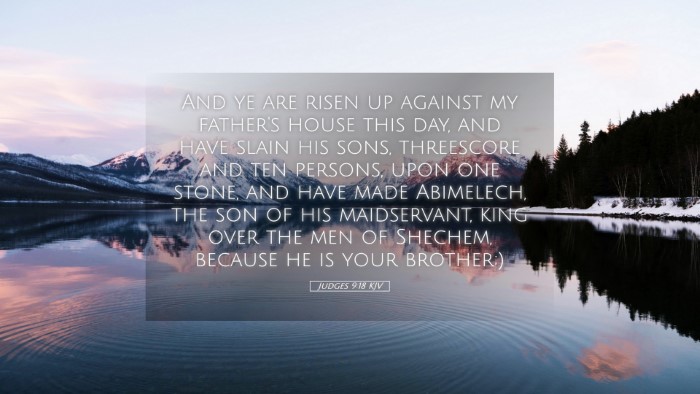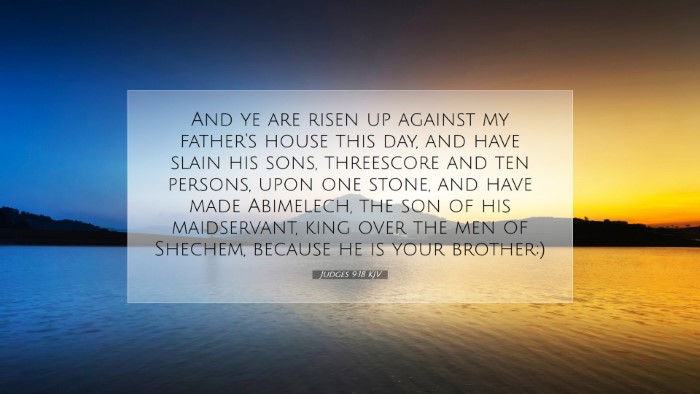Bible Commentary on Judges 9:18
Verse Context: Judges 9:18 reads, "But when the spirit of the Lord came upon Jephthah, he passed through Gilead and Manasseh; and from there he went to Mizpah of Gilead; and from Mizpah of Gilead he passed over unto the children of Ammon." This passage is critical in understanding the leadership and the anointing of Jephthah, showcasing how God's spirit equips leaders in times of dire need.
Overview
The narrative in Judges 9 paints a vivid picture of a tumultuous period in Israel's history marked by moral decline and chaos. Central to this chapter is the rise of leaders such as Jephthah, who, despite personal and social challenges, becomes a significant figure in the deliverance of Israel. The commentary provided herein draws from esteemed public domain commentaries including those by Matthew Henry, Albert Barnes, and Adam Clarke to dissect this profound verse and its implications.
The Nature of God’s Spirit
Matthew Henry Commentary: In reflecting on the workings of God's Spirit, Henry denotes that Jephthah's empowerment illustrates the divine enablement for leadership. This empowerment is not based on Jephthah’s merit but rather on God’s sovereign choice to use flawed human vessels for His purpose. Henry emphasizes the transformative power of God's Spirit, which not only equips leaders but also stirs courage in the hearts of the people.
Albert Barnes Commentary: Barnes further expounds on the manifestation of the Spirit described in this passage, highlighting that it signifies divine authority and validation of Jephthah's role as a judge. God's Spirit instills confidence and clarity of purpose—a necessary attribute for a leader confronting powerful adversaries. Barnes outlines that the Spirit here implies both moral and spiritual fortitude, which Jephthah needed to unite the people and inspire them towards a common cause.
Jephthah's Leadership
Adam Clarke's Perspective: Clarke offers insights into Jephthah's character, noting that his origins as a son of a harlot created initial skepticism among the Israelites. Yet, his remarkable ability to rally the people highlights a key aspect of leadership—the ability to transcend one’s past. Clarke poignantly discusses the fact that true leadership drawn from God's Spirit recognizes no social boundaries; it is purely based on divine selection and purpose.
Historical and Theological Implications
The historical context of Judges reflects a society in moral decay, repeatedly turning away from God. The reliance on God’s Spirit for leadership evokes a theological principle that resonates through time—God is more interested in the heart and obedience of His chosen leaders than their historical status or social standing. The commentary illustrates that as the Israelites faced the Ammonite threat, it was not merely military strategy that would secure their safety but a revival of faith and reliance on God.
Lessons for Today’s Leaders
- Overcoming Past Struggles: Jephthah's rise shows that one's past does not determine their capacity for leadership in God’s Kingdom.
- Divine Empowerment: Today’s leaders in church and community must seek the Spirit’s guidance, acknowledging that true strength comes from God alone.
- Unity in Adversity: Jephthah united a fragmented Israel; modern leaders are called to foster unity within their congregations amidst societal fragmentation.
Conclusion
Judges 9:18 serves as a profound reminder of God’s sovereignty in choosing leaders for His people. Jephthah’s story exemplifies how God utilizes individuals, regardless of their background, to fulfill His divine purposes. Through summarizing the insights from Henry, Barnes, and Clarke, it becomes evident that spiritual empowerment is essential for righteous leadership. As we reflect on this verse, may pastors, students, and theologians be encouraged to seek the empowerment of God’s Spirit in their pursuits and to remember that God's purposes often come through the most unexpected of individuals.


